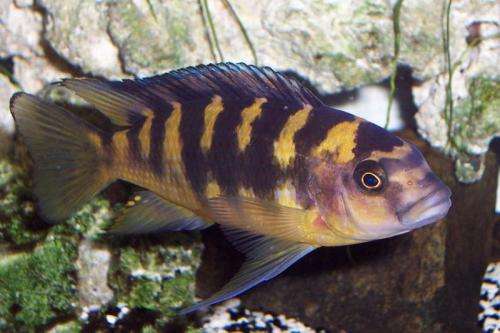Fish cooperate for selfish reasons

Why do animals help raise offspring that aren't their own? A new study by an international team of researchers from Sweden, Canada and the UK shows that fish cooperate to raise another fish's offspring to reduce their own risk of being eaten by a predator.
In an article published yesterday in the journal Nature Ecology and Evolution John Fitzpatrick, a lecturer at Stockholm University, and his colleagues show self interest is what leads to the evolution of complex cooperative societies in African cichlid fishes.
"In some group living animals – like meerkats – a few dominant individuals do all the breeding and receive help in raising their offspring from other members of the group. In birds and mammals, this helping behaviour evolves because the helpers are related to the offspring they are caring for. This wasn't the case in cichlid fishes", says Fitzpatrick, the senior author on the study.
To determine which behaviours are associated with cooperatively rearing offspring, the researchers examined the behaviours of almost 70 cichlid species living in Lake Tanganyika, Africa.
"Our results show that cichlids followed a different path to cooperation that what we see in other animal groups", explained Sigal Balshine, a Professor at the McMaster University and one of the authors of the article. "For cichlids, living in a group reduces your chances of being eaten by a predator. So it is likely that fear of predators is a driving factor behind the evolution of helping behaviour".
"From an evolutionary standpoint, this is highly interesting", says John Fitzpatrick. "These cichlid fish have found a model where cooperation works because of it is so hard to make it on your own. Basically, it´s cooperation for selfish reasons."
Cooperation in cichlid fish may be different form other species because they have short life spans, which prevents family groups from becoming established.
More information: Cody J. Dey et al. Direct benefits and evolutionary transitions to complex societies, Nature Ecology & Evolution (2017). DOI: 10.1038/s41559-017-0137
Journal information: Nature Ecology & Evolution
Provided by Stockholm University
















